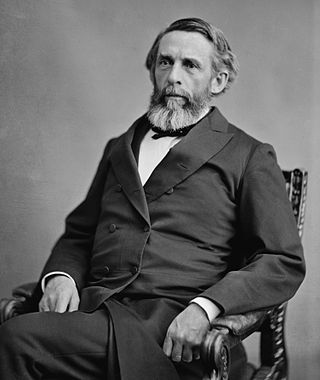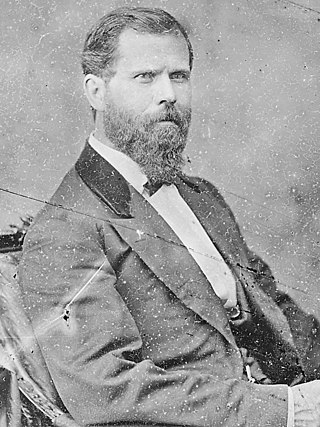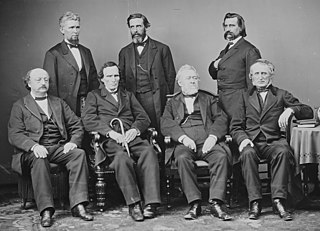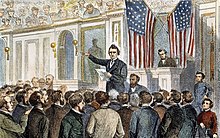
James Falconer "Jefferson Jim" Wilson was an American lawyer and politician. He served as a Republican U.S. Congressman from Iowa's 1st congressional district during the American Civil War, and later as a two-term U.S. Senator from Iowa. He was a pioneer in the advancement of federal protection for civil rights.

George Sewall Boutwell was an American politician, lawyer, and statesman from Massachusetts. He served as Secretary of the Treasury under U.S. President Ulysses S. Grant, the 20th Governor of Massachusetts, a Senator and Representative from Massachusetts and the first Commissioner of Internal Revenue under President Abraham Lincoln. He was a leader in the impeachment of U.S. President Andrew Johnson, and served as a House manager (prosecutor) in the impeachment trial.

The impeachment of Andrew Johnson was initiated on February 24, 1868, when the United States House of Representatives passed a resolution to impeach Andrew Johnson, the 17th president of the United States, for "high crimes and misdemeanors". The alleged high crimes and misdemeanors were afterwards specified in eleven articles of impeachment adopted by the House on March 2 and 3, 1868. The primary charge against Johnson was that he had violated the Tenure of Office Act. Specifically, that he had acted to remove from office Edwin Stanton and to replace him with Brevet Major General Lorenzo Thomas as secretary of war ad interim. The Tenure of Office had been passed by Congress in March 1867 over Johnson's veto with the primary intent of protecting Stanton from being fired without the Senate's consent. Stanton often sided with the Radical Republican faction and did not have a good relationship with Johnson.

Samuel Scott Marshall was an American politician and attorney who served a total of seven terms as a U.S. representative from Illinois. He was a member of the Democratic Party.

The impeachment trial of Andrew Johnson, 17th president of the United States, was held in the United States Senate and concluded with acquittal on three of eleven charges before adjourning sine die without a verdict on the remaining charges. It was the first impeachment trial of a U.S. president and was the sixth federal impeachment trial in U.S. history. The trial began March 5, 1868, and adjourned on May 26.

The 46th and current U.S. president Joe Biden has seen multiple efforts by some members of the Republican Party to impeach him, mostly in retaliation for the first and second impeachments of 45th U.S. president Donald Trump in 2020 and 2021, respectively. An impeachment inquiry against Biden was launched in September 2023, without a vote, by House Speaker Kevin McCarthy, who forwarded the inquiry to the House Committee on Oversight and Accountability.

During his presidency, Andrew Johnson, the 17th president of the United States, saw multiple efforts during his presidency to impeach him, culminating in his formal impeachment on February 24, 1868, which was followed by a Senate impeachment trial in which he was acquitted.
The first impeachment inquiry against Andrew Johnson was launched by a vote of the United States House of Representatives on January 7, 1867, to investigate the potential impeachment of the President of the United States, Andrew Johnson. It was run by the House Committee on the Judiciary.
The second impeachment inquiry against Andrew Johnson was an impeachment inquiry against United States President Andrew Johnson. It followed a previous inquiry in 1867. The second inquiry, unlike the first, was run by the House Select Committee on Reconstruction. The second inquiry ran from its authorization on January 27, 1868, until the House Select Committee on Reconstruction reported to Congress on February 22, 1868.
The House Select Committee on Reconstruction was a select committee which existed the United States House of Representatives during the 40th and 41st Congresses with a focus related to the Reconstruction Acts. The 39th Congress had had a similar joint committee called the United States Congressional Joint Committee on Reconstruction.

In the United States, an impeachment inquiry is an investigation or inquiry which usually occurs before a potential impeachment vote.
Samuel Chase, an associate justice of the Supreme Court of the United States, was impeached by the United States House of Representatives on March 12, 1804 on eight articles of impeachment alleging misconduct. His impeachment trial before the United States Senate delivered an acquittal on March 1, 1805, with none of the eight articles receiving the two-thirds majority needed for a conviction.

On May 16, 1868, the United States House of Representatives authorized the impeachment managers (prosecutors) of the impeachment trial of Andrew Johnson to conduct into possible "improper or corrupt means" to influence the vote of members of the United States Senate in the impeachment trial. The investigation was launched before the adjournment of the trial and continued after the trial adjourned on May 26, 1868. The leading figure of the investigation was Benjamin Butler. The final report of the investigation was published on July 3, 1868.
The Command of Army Act is a law that was in effect under the 1867–1868 appropriations act for the United States Army. The appropriations act under which the law was in place had been passed by the United States Congress on March 2, 1867, and signed by President Andrew Johnson on March 4, 1867. It was one of several pieces of legislation that the United States Congress passed to curb the powers of Andrew Johnson as president of the United States. The Congress' efforts to curb Johnson's powers was motivated by tensions over reconstruction, with Johnson being regarded as an obstructor of the Republican supermajority-led Congress' designs for reconstruction, especially those sought by the Republican Party's "Radical Republican" faction.
Eleven articles of impeachment against United States President Andrew Johnson were adopted by the United States House of Representatives on March 2 and 3, 1868 as part of the impeachment of Johnson. An impeachment resolution had previously been adopted by the House on February 24, 1868. Each of the articles were a separate charge which Johnson would be tried for in his subsequent impeachment trial before the United States Senate.

In the United States, federal impeachment is the process by which the House of Representatives charges the president, vice president, or a civil federal officer for alleged misconduct. The House can impeach an individual with a simple majority of the present members or other criteria adopted by the House according to Article One, Section 2, Clause 5 of the U.S. Constitution.
































